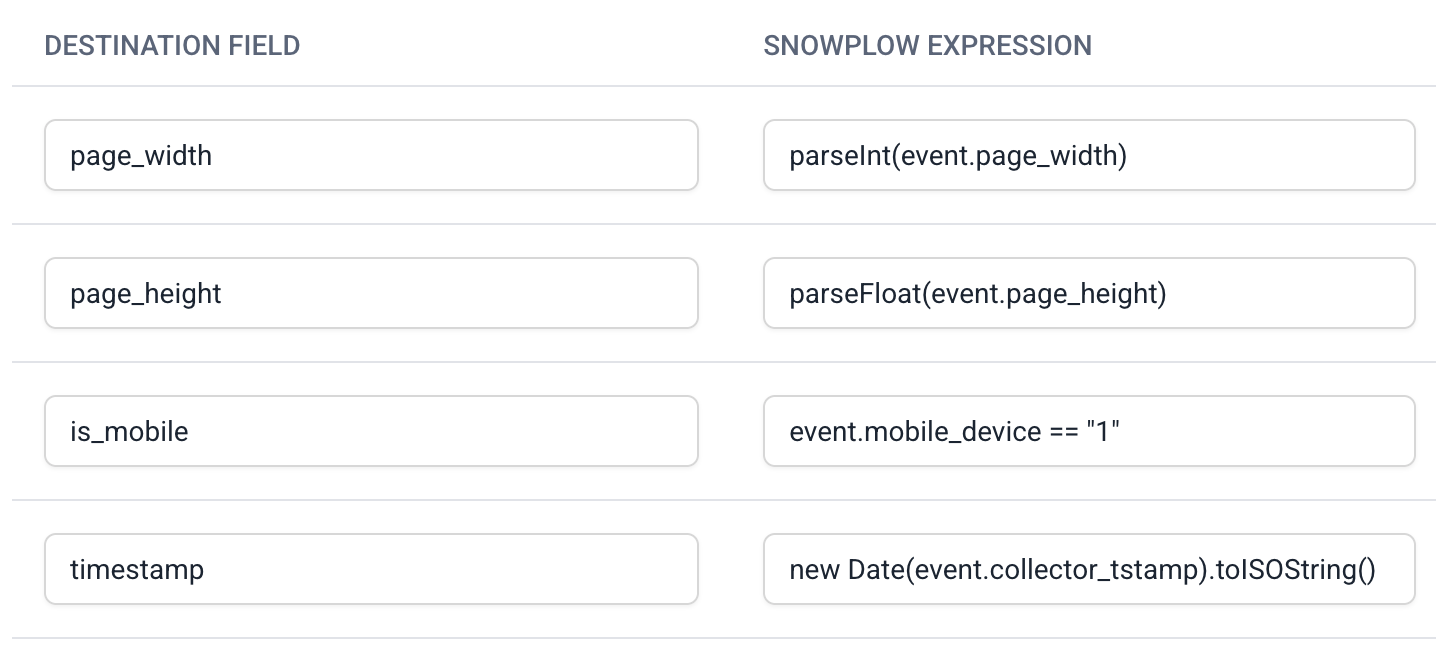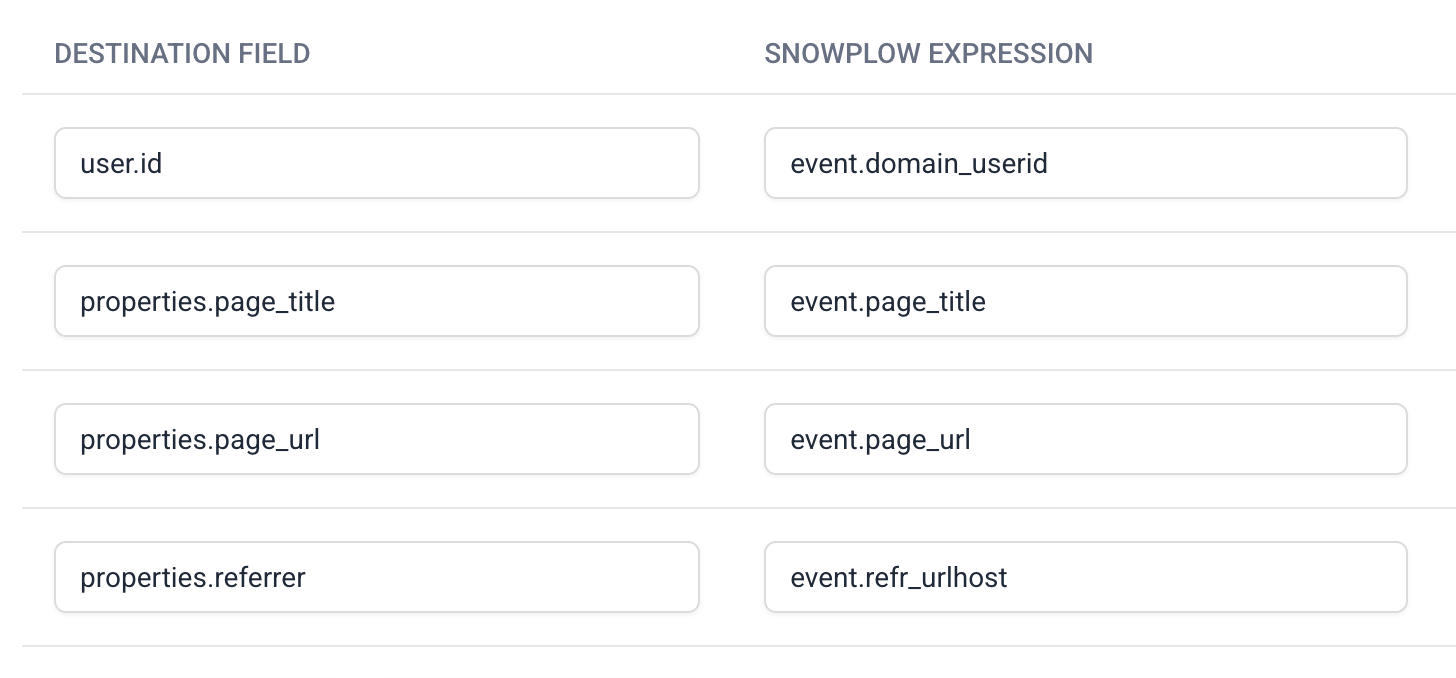Event forwarding filter and mapping reference
Event forwarders use JavaScript expressions for filtering events and mapping Snowplow data to destination fields. These expressions are entered during forwarder setup in Console, specifically in the Event filtering, Field mapping, and Custom functions sections. This reference covers the syntax and available data for these operations.
Available event fields
You can reference any field in your Snowplow events for both filters and field mappings.
Standard atomic fields
Access standard Snowplow fields in your filters and mappings using JavaScript dot notation:
// Standard atomic fields
event.app_id
event.event_name
event.platform
event.collector_tstamp
event.event_id
event.domain_userid
event.user_id
event.page_url
event.page_title
event.useragent
event.network_userid
Custom events and entities
You can also access fields in Snowplow or custom event and entity schemas.
Forwarders transform Iglu schema URIs to JavaScript-safe field names:
| Original schema | Transformed field name |
|---|---|
com.acme/signup/jsonschema/1-0-0 | unstruct_event_com_acme_signup_1 |
com.acme/user_profile/jsonschema/2-1-0 | contexts_com_acme_user_profile_2 |
nl.basjes/yauaa_context/jsonschema/1-0-4 | contexts_nl_basjes_yauaa_context_1 |
Schema names follow these transformation rules:
- Self-describing events:
unstruct_event_prefix - Entities:
contexts_prefix - Dots and slashes become underscores
- Only major version number retained
- Hyphens in vendor/name become underscores
Always use optional chaining (?.) when accessing custom events and entities to handle cases where they're not present.
For a self-describing event with schema com.acme/signup/jsonschema/1-0-0:
// Access event properties
event?.unstruct_event_com_acme_signup_1?.signup_method
event?.unstruct_event_com_acme_signup_1?.user_type
For entities with schema com.acme/user_profile/jsonschema/1-0-0:
// Access entity properties (entities are arrays)
event?.contexts_com_acme_user_profile_1?.[0]?.subscription_tier
event?.contexts_com_acme_user_profile_1?.[0]?.account_created
Event filtering
Event filters determine which events are forwarded to your destination. Only events matching your filter criteria (JavaScript expression evaluating to true) will be processed and sent.
Basic filters
Filter events can contain standard JavaScript comparison operators:
// Single condition
event.app_id == "website"
// Multiple conditions with AND
event.app_id == "website" && event.event == "page_view"
// Multiple conditions with OR
event.event_name == "add_to_cart" || event.event_name == "purchase"
// Check if event is in a list
["page_view", "add_to_cart", "purchase"].includes(event.event_name)
// Exclude events
event.app_id == "website" && event.event_name != "link_click"
Advanced filtering patterns
Regular expressions:
// Match multiple domains
event.page_urlhost.match(/mysite\.(com|fr|de)/)
// Match event name patterns
event.event_name.match(/^purchase_/)
// Match custom field patterns
event?.unstruct_event_com_acme_product_view_1?.category.match(/electronics|computers/)
Define reusable logic in the Custom Functions section:
// Defined in the Custom Function editor panel
function isHighValueUser(event) {
const profile = event?.contexts_com_acme_user_profile_1?.[0];
return profile?.subscription_tier == "premium" ||
profile?.lifetime_value > 1000;
}
// Use in filter
isHighValueUser(event) && event.event_name == "purchase"
Field mapping
Field mapping defines how Snowplow event data is transformed and sent to destination APIs. Each mapping consists of:
- A destination field name (key)
- A JavaScript expression that extracts the value from your Snowplow event (value)
The code snippets below contain JavaScript expressions that you can include in the Snowplow expression mapping field in the UI.
Basic mappings
Map standard event fields directly:

// sample output
{ "event_type": "page_view" }
You can also apply fallback and conditional logic:

// sample output
{
"user_id": "a50d3dfe-ba21-432e-a165-1a1d2d633693"
"source": "website"
}
You can also send static values:

// sample output
{ "source": "snowplow" }
Data transformation
Convert data types, such as strings, boolean values, and dates:

// sample output
{
"page_width": 720,
"page_height": 600,
"is_mobile": true,
"timestamp": "2025-10-01T18:35:38.563Z"
}
Use standard Javascript String methods to manipuate strings:
// Case conversion
event.event_name.toLowerCase()
event.page_title.toUpperCase()
// String operations
event.page_url.replace("http://", "https://")
event.page_title.substring(0, 100)
event.page_urlpath.split('/')
Map to nested objects using dot notation in field names:

// sample output
{
"user": {
"id": "user123"
},
"properties": {
"page_title": "Home Page",
"page_url": "https://example.com",
"referrer": "google.com"
}
}
Custom mapping functions
Define complex transformations as functions in the custom functions section. You can then reference these functions in filters and mappings. Below are a few example transformations:
// Event name formatting
function formatEventName(event) {
const nameMap = {
'page_view': 'Page Viewed',
'add_to_cart': 'Product Added to Cart',
'purchase': 'Purchase Completed'
};
return nameMap[event.event_name] || event.event_name;
}
// Extract product data
function extractProductInfo(event) {
const product = event?.unstruct_event_com_acme_product_1;
if (!product) return null;
return {
id: product.product_id,
name: product.product_name,
category: product.category,
price: parseFloat(product.price),
currency: product.currency || 'USD'
};
}
// User profile enrichment
function buildUserProfile(event) {
const session = event?.contexts_com_snowplowanalytics_snowplow_client_session_1?.[0];
const geo = event?.contexts_com_snowplowanalytics_snowplow_geolocation_context_1?.[0];
return {
user_id: event.domain_userid,
session_id: session?.sessionId,
location: geo ? `${geo.latitude},${geo.longitude}` : null,
user_agent: event.useragent,
platform: event.platform
};
}
Other common patterns
Timestamp formatting:
// ISO 8601 format
new Date(event.collector_tstamp).toISOString()
// Unix timestamp
Math.floor(new Date(event.collector_tstamp).getTime() / 1000)
// Readable format
new Date(event.collector_tstamp).toLocaleDateString()
Conditional field mapping:
// Platform-specific mapping
event.platform == "web" ? event.page_url : event.screen_name
// Event-type specific properties
event.event_name == "purchase" ?
event.unstruct_event_com_acme_purchase_1?.total_value :
null
Array handling:
// Get first entity
event?.contexts_com_acme_product_1?.[0]?.product_name
// Map all entities
event?.contexts_com_acme_product_1?.map(p => p.product_id)
// Filter and transform entities
event?.contexts_com_acme_product_1
?.filter(p => p.price > 10)
?.map(p => ({ id: p.product_id, name: p.product_name }))